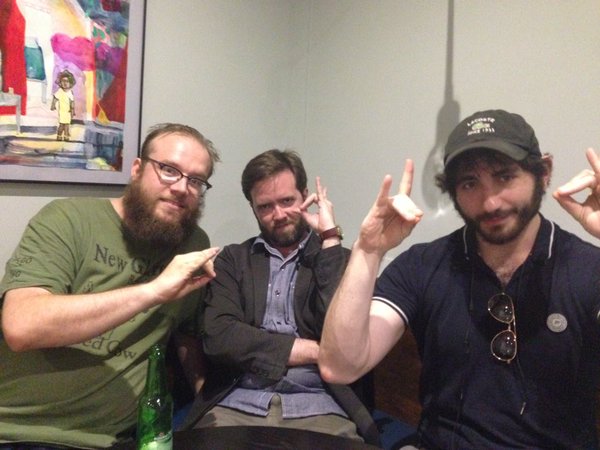The left-wing podcast Chapo Trap’s House’s ascendance in the online media sphere is built on vulgarity. At first, this is just an observation and not a value judgment, and in some ways this brash attitude among its hosts – Will Menaker, Matthew Christman, Felix Biederman, Virgil Texas and Amber Frost – has proven to bring left ideas out of the cold halls of academia and into a “real world” that could do without political correctness. They’ve taken on the term, “the dirtbag left.”
And there’s a fine American tradition of mixing political dissent with septic humor that’s thrown mercilessly at it’s opponents – think George Carlin or Bill Hicks. The numbers for the show speak to its success: the show brings in $65,000 per month in paid listener subscriptions, according to its home page at Patreon. Fans see the show as a vehicle to promote an agenda that liberal establishment couldn’t: workers’ rights, universal health care and other parts of the Bernie Sanders platform, all with acerbic wit aimed at right-wing pundits, mainstream journalists and the liberal establishment.
The show has earned high-brow media attention – coverage in the New York, the New York Times and Macleans. Not only is the show funny – Christman is sort of what you get if Master Shake from Aqua Teen Hunger Force joined the Democratic Socialists of America – but it’s being cast as part of the vanguard that is shifting younger Americans away from tepid liberalism and instead to social democracy and Sanders’s popularity. What’s not to love?
Most of Chapo’s off-color humor is a welcomed routine of punching up at elites who have betrayed the 99 percent, but unfortunately, the show is marred by a tendency to punch down as well. The hosts seem to share in a delight of ridiculing and mocking autistic people, especially on social media. This isn’t just a once in a while joke; there are dozens of jokes on Twitter from Menaker, Christman and Biederman dating back to 2015. The jokes take on a variety of themes, all of which are typical of neurotypical prejudices toward people on the autism spectrum:
-A desire to exploit autistic people:
Will Menaker, Dec. 12, 2016: “This weekend Brandy told me I looked like an ‘undercover autistic cop’ and let’s just say I have a new TV show I’m ready to pitch.”
-Promoting stereotypes about autistic people, like they’re all good at math or obsessed with trains:
Matthew Christman, Dec. 2, 2015: “I must have been double-vaccinated or something because my crippling awareness of social cues and awful math skills make me an anti-autistic.”
-Linking autistic people to criminality and extremism:
Will Menaker, July 27, 2015: “We are witness to a great becoming: the conservative [movement] transforming from one of wealth and reaction to autistic neo-Nazis who worship Odin.”
-Denying the existence of atypical neurology:
Matthew Christman, June 28, 2016: “It wasn’t until the mid-21st century that doctors realized the condition they called ‘autism’ was actually just ‘being online.’”
-Denouncing people they don’t like as being autistic:
Felix Biederman, April 7, 2016: “Pundits live in an atmosphere that is basically a high school for rich autistic kids and believe everyone is like them.”
And it goes on and on.
This focus on the autistic community doesn’t come out of nowhere, but, in fact, is eerily similar to tropes on the alt-right. The alt-right show the Right Stuff railed against “political autism,” while the alt-right “autistic screeching” meme reduced all protest toward reactionary power to some sort of physical inability to handle earthly reality. We’re not quite at the point where, like the Nazis did under their reign, the government is putting people with disabilities in death camps, but Donald Trump’s mocking of a disabled reporter on the campaign trail only reaffirmed his support among conservatives, and already he aims to roll back Medicaid and the cut-throat approach of his education secretary, Betsy DeVos, will adversely affect the disabled, autistics included.
For Ari Ne’eman, the past president and co-founder of the Autistic Self Advocacy Network, there’s a long history of using “autistic” as an insult in all political circles. “Sometimes it’s in obviously insulting ways, such as the use of ‘retard’ or ‘retarded’ as a pejorative, something that people with intellectual disabilities have long objected to, with good reason,” he said in an e-mail, acknowledging that he wasn’t commenting on the Chapo tweets, since he has not listened to the show.
“Other times it is in efforts to attach diagnoses to political opponents to discredit them, and it is in this area that autism is most frequently invoked. For many of the people who use the diagnosis as an insult, calling someone autistic is shorthand for calling them a loser or someone whose judgment is inherently illegitimate.”
He continued, “In many ways, the presence of this tendency in left-wing and liberal circles (where those of us of a similar persuasion might expect better) reinforces the degree to which disability remains a second-class minority group in the eyes of many progressives, not subject to either the same policy or rhetorical commitments as other marginalized groups. At times, you’ll see people on the left who use these terms point to their willingness to support social services funding or defend [Social Security Disability Insurance] against cuts as proof that their use of disability as an insult should be viewed as different from similar attempts on the right.
Aside from ignoring the harmful cultural impact of that kind of language, that argument also ignores the reality that – like issues of race and gender – addressing the needs of the disability community requires more than just a nominal commitment of ‘doing good things’, it requires actual engagement with a community with specific policy preferences and priorities, who need to be represented and included in the discourse and leadership of social movements to ensure their needs are met.”
So what accounts for Chapo’s fixation on autistics? The entire show, and its cohort of followers, is built on a new formation of the American left that eschews the political correctness that made liberals an easy target for the right, and is built on a type of humor that could bring someone who might drift to the alt-right, instead, to a class-based left agenda. And if we’re to take a cynical showbiz perspective, the Chapo crew knows, like Howard Stern and Don Imus before them, that shock-jock and alpha-male antics bring home the bacon.
The hosts of Chapo declined to comment, citing a general policy of ceasing media interviews. “[W]e think the show speaks for itself,” Frost said in an e-mail.
The problem goes beyond a mere hurtfulness, it’s a failure for the show’s hosts or its fans to come to terms with this reactionary messaging undermines the show’s stated goal of spreading a gospel for a more socially democratic order. If left-wing people are going to denounce Bill Maher because he has an anti-Islamic record or for using the “n word” but ignore Chapo’s record against disabled people, then they’re telling the world that their compassion for the vulnerable and outrage against injustice is not genuine.
As this summer began, disabled Americans were physically removed by Capitol Hill Police for protesting Senate Majority Leader Mitch McConnell’s support for repealing ObamaCare. In such a profoundly political moment, one can’t really tell if the Chapo team is rooting for a marginalized group fighting against brutality austerity, or laughing from the sidelines.
And that truly is the bigger dilemma for the so-called “dirtbag left.” The Chapo hosts, and their fans, are correct that we’re living in a dangerous political moment, not just because the right is in power in the United States with a cartoonishly demagogue in the White House, but because the Democratic Party establishment and the mainstream media offer no real alternative or battle plan.
But it seems that the Chapo hosts are less interested in building an alternative than continuing a shtick that ensure its cash flow. The punching up is funny, but the punching down is harmful to a larger political project.
Photograph courtesy of Chapo Trap House . All rights reserved.





